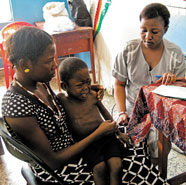Dr. Toyin Ajayi featured by Massmed.org about her work in Sierra Leone under a MMS and Alliance Charitable Foundation Grant to Improve Pediatric Care in Sierra Leone
Last year, the MMS and Alliance Charitable Foundation awarded a grant to Toyin Ajayi, M.D., a second-year resident in BU’s Department of Family Medicine, to support physicians and study barriers to health care in Sierra Leone. Dr. Ajayi shares her experiences.
I spent about 20 percent of my time at ODCH engaged in direct patient care and teaching medical students. Sick children were often brought to the hospital in moribund condition; many had been ill for several days or even weeks prior to presentation. It was often frustrating to manage these patients, knowing that whatever I did would almost certainly be too little, too late.In the 18 months since I left, there have been profound changes to the quality of health care that’s delivered at Ola During Children’s Hospital (ODCH), Sierra Leone’s only tertiary pediatric hospital. Most importantly, user fees for the health care of pregnant and postpartum women and children 5 years of age and younger were eliminated. This is part of a wave of government recognition that even nominal health care fees can pose insurmountable barriers to poor families.
Why were children from the surrounding slums – many within easy walking distance of the hospital – often brought in so sick that they were beyond saving? This was my research question. I conducted informal focus groups with combras, women who care for small children in a slum of Freetown, where sanitation is poor, few have access to nutritious food, and immunization rates are less than 50 percent. Here are some of the answers that I uncovered:

- Families often opt for traditional healing (e.g., to treat seizures believed to be due to evil spells).
- Elders and family leaders help make health care decisions and take into account lost income from time spent not working and past negative hospital experiences.
- Many consider the hospital a death sentence.
- Many have experienced ill treatment, discrimination, and attempted bribery by hospital staff. Women are often afraid their children will be mistreated if they complain.
My colleagues and I brainstormed ways to address the need for staff accountability, a community feedback mechanism, and an attitudinal change toward poor patients. Nurses now wear name tags, and a hospital liaison chosen by the community seeks local feedback and input.
Later this year I hope to conduct a formal study that will focus on developing culturally sensitive and plausible explanations for health and ill health, as well as compelling arguments to support the hospital as the preferential option for health care.
– Toyin Ajayi, M.D.